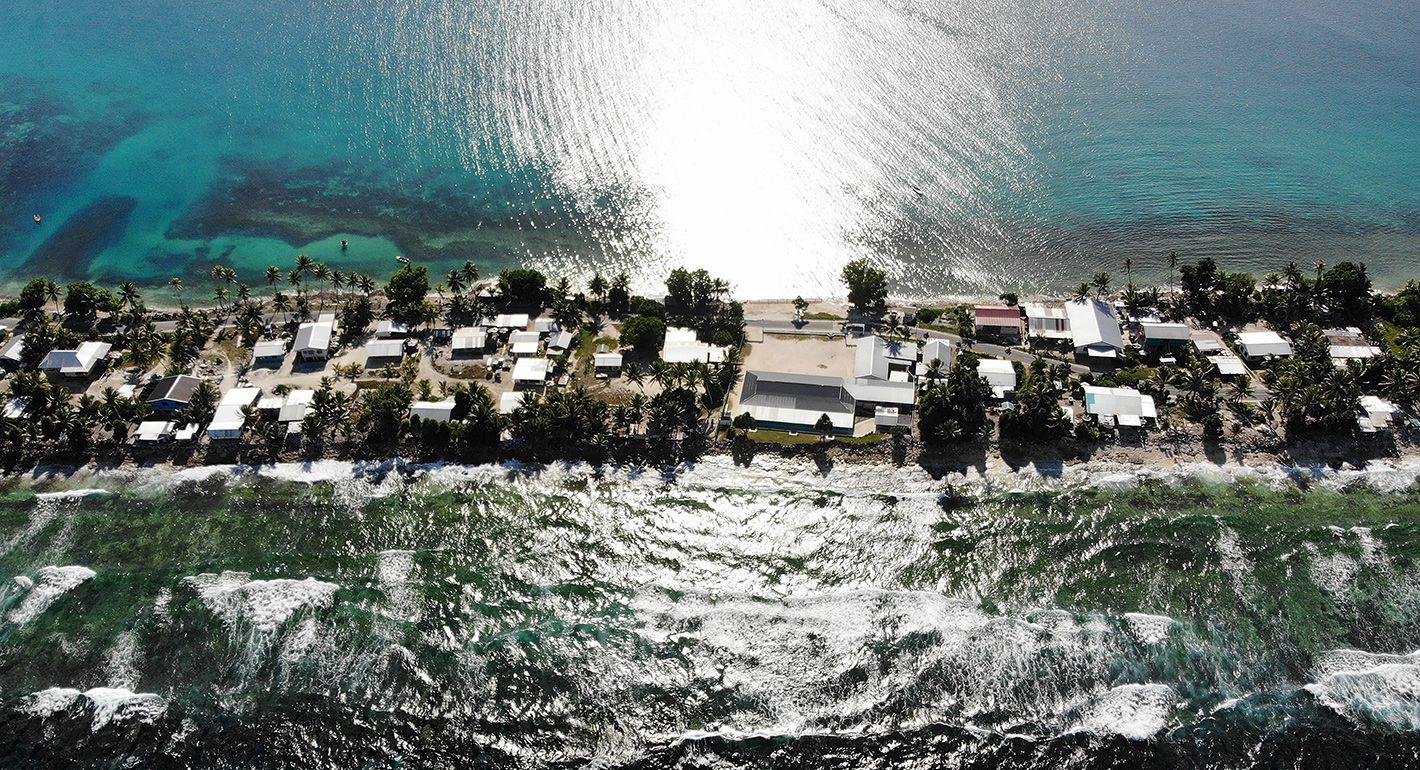Regional free movement agreements, like that of the Organisation of Eastern Caribbean States, offer unique potential to address the human mobility challenges posed by the climate crisis.
Liliana Gamboa, Debbra Goh

Source: Getty
Amid slow progress in climate multilateral negotiations, bilateral agreements can offer states a model for addressing the challenges of climate mobility.
The Australia–Tuvalu Falepili Union Treaty is the world’s first and only bilateral agreement on climate mobility. This treaty, representing a collective security and sovereignty partnership, establishes a first-of-its-kind mobility pathway for Tuvaluans to obtain Australian permanent residency and, ultimately, citizenship.1 Unlike other visa programs in Oceania, such as the Pacific Australia Labour Mobility (PALM) scheme or New Zealand’s Pacific Access Category,2 the Falepili Union provides a more inclusive pathway that is not solely focused on labor mobility. Most significantly, this bilateral treaty—described by a spokesperson for Australia’s foreign affairs department as a “first agreement of its kind anywhere in the world, providing a pathway for mobility with dignity as climate impacts worsen”—recognizes the “special and unique circumstances faced by Tuvalu and that climate change is Tuvalu’s greatest national security concern.” The values of “falepili”—a Tuvaluan concept that connotes good neighborliness, duty of care, and mutual respect—form the basis of this partnership, meant to elevate and integrate bilateral relationships between the two nations.
More broadly, the treaty seems to reflect an understanding that addressing climate mobility requires innovative governance arrangements that are sensitive to the needs of affected communities. Effective responses must be tailored to specific contexts and be forward-thinking. Understanding how some responses are developed and negotiated bilaterally, or within subregional contexts, is crucial for creating new frameworks, learning lessons, and drawing conclusions. The Falepili Union, while likely difficult to replicate due to its geopolitical particularities, nevertheless demonstrates that there is a range of policies that can help ease the challenges faced by climate-vulnerable communities—especially policies that enable states to expand choices and offer affected individuals greater mobility, portability of social rights, and agency in addressing the impacts of climate change. It is therefore worth examining several key concepts, climate considerations, and innovative elements incorporated into the agreement.
The Falepili Union represents the latest in a series of efforts led by Tuvalu to confront the existential threat posed by climate change impacts on the nation and its people. Tuvalu is among the most climate-vulnerable states on the planet: a microstate with a population of almost 12,000 people occupying nine coral atolls located in the South Pacific Ocean. Tuvalu covers an area of 26 square kilometers (10 square miles)—less than half the size of Manhattan—and has an average elevation of 2 meters (6.5 feet) above sea level. A 2023 assessment by NASA estimates that the sea level in Tuvalu is rising 1.5 times faster than the global average and projects that, by 2050, half of the main atoll of Funafuti, where more than half of the Tuvaluans reside, could be underwater.
Tuvalu is not the only country concerned about the implications of climate change for its people, territory, and overall statehood. Small island developing states (SIDS) are among the most vulnerable regions to climate change. These nations, including Tuvalu, share intrinsic characteristics such as small, remote territories with populations living along coastlines, limited access to affordable development financing, a heavy dependence on external markets, and limited domestic resources—all of which increase their climate vulnerability. These traits create unique social, economic, and environmental challenges that make the already disproportionate impacts of climate change—such as rising sea levels, extreme weather events, and soil and freshwater salinization—existential threats. These shared concerns have led to collective efforts by many SIDS to advocate for climate change mitigation, adaptation, and loss and damage reparations through international organizations and fora. SIDS have established platforms including the Commission of Small Island States (COSIS) on Climate Change and International Law,3 the Alliance of Small Island States (AOSIS), the International Conference on Small Island Developing States,4 the Rising Nations Initiative (RNI),5 and the Pacific Islands Forum,6 among others.
While research from the International Organization for Migration shows that climate mobility will mainly occur internally (within a country), this will likely not be the case for atoll nations, as well as other SIDS, where cross-border movement could play a significant role—a pattern that aligns with the region’s broader history of mobility. Climate change raises numerous challenging questions for inhabitants of SIDS, and Pacific island leaders are acutely aware of the threats posed. In 2024, the Pacific Islands Forum leaders endorsed the Pacific Regional Framework on Climate Mobility, a nonbinding agreement that guides regional stakeholders in planning for climate mobility, including safeguarding the ability to stay in place. The framework acknowledges the realities and complexities of climate mobility in the region, noting that it is already happening, with “irreversible changes” influencing the “drivers and scope of human mobility.” Additionally, it states that “adopting a proactive and planned approach to climate mobility will help ensure that [Pacific island leaders are able to] respond to enhance, not diminish, [their] people’s resilience and well-being.” Ultimately, the framework aims to promote “rights based and people-centred movement in the context of climate change.” Providing legal, safe, and dignified mobility pathways for SIDS can represent a lifeline for individuals who move, as well as for those who choose to stay.
In August 2023, then prime minister of Tuvalu, Kausea Natano, proposed the creation of the Falepili Union agreement to Australian Prime Minister Anthony Albanese. The Australia-Tuvalu Falepili Union Treaty was signed in November 2023, followed by submissions to the Parliament’s Joint Standing Committee on Treaties from interested stakeholders and a public hearing. Six months later, an explanatory memorandum was issued with additional details for implementation and interpretation, and the treaty officially entered into force in August 2024. It includes three key aspects: climate cooperation, human mobility with dignity, and cooperation for security and stability.
The concept of mobility with dignity was first proposed by the island country Kiribati in recognition that efforts to reduce greenhouse gas emissions through the United Nations Framework Convention on Climate Change processes would be insufficient for Pacific nations. Kiribati’s government at the time devised a strategy aimed at preserving cultural integrity and ensuring access to education, employment, and healthcare for its citizens abroad. This strategy focused not only on enhancing access to legal migration pathways but also on boosting skills and knowledge within the communities of origin through coordinated efforts.7 By empowering Kiribati citizens to decide when, where, and how to migrate, the goal was to ensure that those who moved could live with dignity abroad. Although a shift in political priorities in Kiribati prevented the development of a formal pathway from this strategy, legal scholars have recently drawn from both international and domestic human rights law to give legal force to this novel concept to address climate mobility. Some suggest that it could serve as a framework for managing climate change impacts in a way that averts future conflicts.
Falepili Union Treaty: Article 3, Human Mobility With Dignity
Article 3 of the Falepili Union, titled “Human Mobility with Dignity”and actively promoted by the Australian government, outlines the foundation for creating a mobility pathway for Tuvaluans to live, study, and work in Australia, with access to essential rights and services such as Australian education, health, and key income and family support upon arrival. Other elements ensure that the original concept—for migrants to live in dignity, thrive, and successfully integrate into their new host community—is fulfilled. These include settlement support, subsidized education on equal terms with Australian citizens, access to Medicare and the National Disability Insurance Scheme, various student allowances and loan programs, as well as family tax benefits and childcare subsidies.
The explanatory memorandum states that the Falepili Union scheme will initially provide for 280 visas each year, though this number can be adjusted annually by mutual agreement. Various provisions under the Falepili Union’s “Human Mobility with Dignity” pathway are similar to other labor schemes, such as the Pacific Engagement Visa, an existing Australian permanent residence visa available to nationals of Fiji, Micronesia, Nauru, Palau, Papua New Guinea, Solomon Islands, Timor-Leste, Tonga, Tuvalu, and Vanuatu, with a total annual allotment of up to 3,000 visas.8 This includes the freedom of unlimited travel to and from Australia, meaning beneficiaries are not required to stay in the country for specific periods. This is unlike permanent residency models in other regions, such as the United States, where extended absences can negatively affect residents’ immigration status and potentially lead to their loss. The Falepili arrangement instead allows for circular mobility, enabling beneficiaries to travel freely to their country of origin without risking their legal status, which can be crucial in the context of climate impacts. It can help members of the Tuvaluan diaspora maintain their cultural connections and family ties with those remaining in Tuvalu. Additionally, it can promote ongoing diaspora investment in resilience efforts within their communities of origin. One form of diaspora investment could be through remittances: SIDS are among the top recipient countries of remittances by share of GDP, and such funding often goes toward supporting postdisaster recovery for family members and other community agriculture, water, and coastal resilience efforts.
Additionally, the Falepili Union visa includes provisions that acknowledge the specific aspects of climate mobility. The visas are available to all Tuvaluans: Children can apply as dependents, while individuals ages eighteen and older are able to apply independently, including those with disabilities, special needs, and chronic health conditions.9 The Falepili Union mobility pathway has no upper age limit, enabling the elderly to also apply for this visa category. This approach could serve as a relevant policy alternative to address the needs of so-called trapped populations—those who need to and want to leave areas of high climate risk but lack the means to do so. As noted earlier, some other visa pathways, such as the Pacific Engagement Visa, are currently focused on labor mobility and hence only open to individuals between eighteen and forty-five years of age.
The Falepili Union recognizes that climate mobility is often a last resort for many citizens. Therefore, it not only aims to facilitate cross-border movement to Australia but also commits to climate cooperation with Tuvalu in response to the “existential threat posed by climate change.” Article 2 of the treaty acknowledges the “desire of Tuvalu’s people to continue to live in their territory where possible” and notes that “more recent technological developments provide additional adaptation opportunities.” As such, both Australia and Tuvalu pledge to promote “Tuvalu’s adaptation interests to other countries, including through regional and international forums.”
Falepili Union Treaty: Article 2, Climate Cooperation
This collective effort to strengthen climate resilience in Tuvalu also involves investing in practical adaptation measures, with Australia committing approximately 25 million U.S. dollars to the Tuvalu Coastal Adaptation Project to expand safe land along the Tuvalu coastline. Australia also intends to provide approximately 57 million U.S. dollars in official development assistance during 2024–2025 to Tuvalu, supporting initiatives such as building Tuvalu’s first undersea telecommunications cable, increasing the Tuvalu Trust Fund (Tuvalu’s sovereign wealth fund), and enhancing the safety and connectivity of Tuvalu’s aviation sector.
The Falepili Union takes a comprehensive approach to climate mobility. Not only does the treaty create a dignified mobility pathway for those who choose to leave Tuvalu, it also commits to strengthening climate resilience in Tuvalu, thereby fostering conditions that enable people to stay if they wish. Together, these elements address key challenges of climate mobility regarding voluntary and involuntary immobility, which have traditionally been overlooked in migration discussions but are crucial in the context of climate change.
The alarming projections of sea level rise, along with other effects of climate change, create an uncertain outlook for Tuvalu’s future, which initially included concerns about its statehood. As a result, the nation underwent a constitutional review process from 2016 to 2023. A constitutional amendment was enacted in October 2023 to add language to address the implications of climate change for this small island nation. The new preamble to the constitution includes a recognition that the people of Tuvalu are “deeply concerned with the imminent existential threat of Climate Change and sea-level rise to the security and survival of Tuvalu, and the urgent need for meaningful work with the rest of the world to protect and save Tuvalu.”
More significantly, the constitution now includes a declaration of Tuvalu’s enduring statehood and a redefinition of its territorial delineation. Section 2.1 of the constitution was amended to state that “the State of Tuvalu within its historical, cultural, and legal framework shall remain in perpetuity in the future, notwithstanding the impacts of climate change or other causes resulting in loss to the physical territory of Tuvalu.” The amendment also stated that Tuvalu’s area is to be bound by baseline coordinates that “shall remain unchanged, notwithstanding any regression of the low water mark or changes in the geographical features of coast or islands, due to sea-level rise or other causes.”
Beyond redefining statehood in the Tuvaluan constitution, the nation is also preparing for potential territorial loss by aiming to become the First Digital Nation, moving government functions to the digital realm and creating an archive of land, history, and culture online. As climate change alters the physical landscape of territories and, in turn, affects small islands’ ability to support a permanent population, Tuvalu’s constitutional amendment, along with other efforts, represent a significant attempt to safeguard its sovereignty and integrity, a prerogative provided by Article 3 of the Montevideo Convention on the Rights and Duties of States.
This is why Tuvalu’s efforts have been both domestic and international. Tuvaluans actively participate in regional and global fora, advocating specific interpretations on territory and statehood. In March 2023, the Pacific Islands Forum held a regional conference to examine legal and policy solutions for preserving statehood and protecting people affected by sea level rise. This event followed the 2021 Pacific Islands Forum Leaders Declaration on Preserving Maritime Zones in the Face of Climate Change–Related Sea-Level Rise, which dictated that the maritime zones of Pacific states remain as they are, despite rising sea level. Later, the forum leaders adopted the 2023 Pacific declaration, affirming that international law supports the continuity of statehood despite territorial loss due to climate change. The declaration underscores that Pacific leaders view climate change as a major threat and highlights their efforts to influence global legal standards on statehood and population rights amid rising sea levels.
These efforts seek to challenge a traditionalist view that geographical territories are fixed and a required element of statehood under international law. In response to this question, there has been a series of authoritative pronouncements from the UN Sixth Committee, the International Law Commission, and the International Law Association, which consistently and progressively argue that losing territory does not necessarily mean losing statehood.
Most recently, the International Court of Justice (ICJ)—the world’s highest court—has also reaffirmed this view. On July 23, the ICJ responded to a request unanimously approved by the United Nations General Assembly, following an initiative led by the Pacific nation Vanuatu, to provide guidance on the states’ obligations under international law regarding climate change. In its long-awaited advisory opinion, the ICJ affirmed that “once a State is established, the disappearance of one of its constituent elements would not necessarily entail the loss of its statehood.” Moreover, the court argued that given the multifaceted challenges posed by sea level rise, the duty to cooperate is even more necessary, “requiring States to take, in co-operation with one another, appropriate measures to address the adverse effects of this serious phenomenon.”
Along these lines, Tuvalu’s efforts have also included requiring all partner nations to recognize its ongoing statehood when entering into bilateral agreements. The Falepili Union is no exception, and the agreement includes Australia’s explicit commitment in Article 2 to recognizing that “the statehood and sovereignty of Tuvalu will continue, and the rights and duties inherit thereto will be maintained, notwithstanding the impact of climate change-related sea-level rise,” making it a binding commitment to enduring statehood, even in the face of loss of territorial integrity.
The Montevideo convention presumes that a nation is made up of a permanent population residing on a defined territory, governed by a government capable of engaging in international relations. However, climate change could usher in a new era where territorial integrity will no longer be sacrosanct, and states may no longer have most of their population in situ. This raises broader questions about sovereignty and national self-determination. For example, can states function when much, if not all, of their populations move or are displaced into territories where their home governments may lack jurisdiction? For Tuvaluans, and legal experts, the answer is seemingly yes. Some scholars even argue that efforts to protect populations and government functions, through dual nationality and voting rights, regardless of their location, could be a way forward for maintaining statehood amid rising sea levels.
The Falepili Union represents a significant bilateral agreement regarding climate mobility and entails substantial investments to strengthen Tuvalu’s resilience. Nevertheless, the treaty has faced criticism from Tuvaluans over its collective security features, which some perceive as infringing on Tuvalu’s sovereignty.
Falepili Union Treaty: Article 4, Cooperation for Security and Stability
This is most evident in Article 4 of the treaty, which outlines the bilateral agreement for “cooperation for security and stability.” It states that Australia commits to supporting Tuvalu in responding to “a major natural disaster, health pandemic or military aggression.” In exchange, Article 4 notes that “Tuvalu shall mutually agree with Australia any partnership, arrangement or engagement with any other State or entity on security and defence-related matters. Such matters include but are not limited to defence, policing, border protection, cyber security and critical infrastructure, including ports, telecommunications and energy infrastructure.” In short, in return for Australia’s support in climate adaptation and development funding, along with assistance during disasters, Tuvalu agrees to obtain Australian permission before engaging with other states on security and defense-related issues. The explanatory memorandum provides additional details of this provision, emphasizing that Article 4 is not intended to prevent other partners from supporting Tuvalu’s “economic and development interests” in areas such as climate adaptation, education, or health. Instead, the primary concern regarding third-party cooperation would be “in the context of regional security dynamics,” as Article 4 would provide Australia with an “insight into Tuvalu’s defence and security related engagement with third parties, including, but not limited to, defence, policing, border protection, cyber security and critical infrastructure, including ports, telecommunications and energy infrastructure.”
While the treaty also establishes measures for joint consultation and dispute settlement between the two parties, Article 4 remains a controversial clause with some concerned that the deal undermines Tuvalu’s national security sovereignty. In March 2024, Tuvaluan Prime Minister Feleti Teo remarked that the collective security elements of the Falepili Union give “the impression of Tuvalu conceding its sovereignty to decide whatever security arrangement it prefers.”
The collective security clause in the Falepili Union comes amid intense geopolitical competition, as China increases efforts to expand its influence in the South Pacific. In 2019, the Solomon Islands and Kiribati severed diplomatic ties with Taiwan and established diplomatic relations with China instead. China quickly made inroads into the region, funding climate adaptation efforts, inking a security agreement with the Solomon Islands in 2022, and building an airstrip project in Kiribati. These developments have spurred Australia’s renewed interest in positioning itself as the region’s security partner of choice. As one of the few nations maintaining diplomatic relations with Taiwan, Tuvalu was deemed a natural regional partner for Australia. The Falepili Union, therefore, serves as a way for Australia to curb China’s growing regional influence and safeguard Australian maritime interests in the South Pacific; Albanese views the treaty as a means to “formalise Australia as Tuvalu’s partner of choice going forward.”
The Falepili Union illustrates the differing threat perceptions in the Indo-Pacific between Tuvalu and Australia. Australia’s concerns are primarily geostrategic, and elements such as the collective security clause offer the country a way to sustain its position while countering China’s increasing influence in the Pacific. Meanwhile, Tuvalu’s concerns mainly relate to climate change as an existential threat, and the Falepili Union offers new mobility options for its citizens while advancing the state’s efforts to establish enduring sovereignty.
The 2023 ratification and subsequent announcement of the Falepili Union came as a surprise for many Tuvaluans, sparking a political upheaval. Parliament members raised concerns that included the lack of public consultation with Tuvaluans and the general lack of transparency surrounding the treaty, with no official versions released to the public. The collective security provisions outlined in Article 4 also raised concerns, with some parliament members viewing it as sacrificing Tuvalu’s interests to become a strategic stronghold for Australia. The domestic backlash was such that opposition leader Enele Sopoaga, prime minister from 2013 to 2019, included a campaign promise during the 2024 general elections to scrap the Falepili Union if elected. He argued that the climate mobility element of the treaty was “dangerous” and would “actually physically eliminat[e] the survival of Tuvaluan people.” Sopoaga viewed the treaty as a threat to Tuvalu’s sovereignty and highlighted Australian hypocrisy in supporting climate resilience measures in Tuvalu without any concomitant domestic commitment to phase out its fossil dependency or support mitigation efforts.
While Sopoaga was indeed reelected as a member of parliament in 2024, Teo, elected as prime minister, was part of the legal team that drafted the Falepili Union. His government recognized the need to secure migration pathways while also ensuring the option to stay, and he therefore continued negotiations on the treaty. The subsequent explanatory memorandum addressed some key concerns from Tuvalu, and the Falepili Union went into effect nine months after its original ratification in November 2023 by the Natano administration.
The effectiveness of the Falepili Union in facilitating climate mobility remains uncertain. Applications for the first visa process opened on June 16, 2025, and closed on July 18, 2025. Within the first four days of the application process, over a third of all Tuvaluans applied for the scheme. Yet, while there is clearly broad interest in this mobility pathway, success cannot be measured solely by the number of applications or visas issued. Likewise, the interest in the scheme should not be viewed as indicative of an immediate desire to leave Tuvalu. Regional experts, such as Jane McAdam, argue that this large show of interest is more so a reflection of a broader desire by Tuvaluans to have “a safety net to ensure people have choices about how they respond to climate change.” Even for those who do decide to move to Australia, for the lofty goals of this treaty to be achieved and for Tuvaluans to benefit from this program, support cannot stop at the border. Tuvaluans who migrate will face ongoing struggles and will need support to integrate into Australian society successfully, including through culturally sensitive and effective settlement services.
Additionally, to ensure that mobility with dignity remains a choice for Tuvaluans, continued investment in key sectors like coastal protection and infrastructure is essential for Tuvalu’s ongoing development. Policy coherence and innovative design to support green jobs and the necessary skills training, along with directing remittances toward public goods and adaptation technologies and practices, could promote such progress. When properly implemented, these bilateral mechanisms could create fair pathways for managing cross-border mobility, helping to address some concerns related to climate mobility.
Freedom for unlimited travel to and from Australia allows recipients of the Falepili Union visas to stay connected to Tuvaluan community members who exercise their right to remain in Tuvalu despite imminent climate risks. Additionally, because these visas do not discriminate based on age or disability, an inclusive policy environment that supports human mobility can be created—a good example of a rights-based approach that could help address the impacts of climate mobility effectively.
The Falepili Union was created to strengthen bilateral relations between Australia and Tuvalu, grounded in the values of “falepili.” While it is clear that the treaty comes with strings attached for Tuvalu, at its core, the Falepili Union is a groundbreaking effort to address the existential threats faced by small island developing states. The successful ratification of the treaty, despite initial skepticism, demonstrates the potential for strategic security partnerships to respond to these threats. Amid slow progress in climate multilateral negotiations, bilateral agreements such as the Falepili Union could serve as an inspiring model of support for states facing the multifaceted challenges of climate mobility.
Carnegie does not take institutional positions on public policy issues; the views represented herein are those of the author(s) and do not necessarily reflect the views of Carnegie, its staff, or its trustees.
Regional free movement agreements, like that of the Organisation of Eastern Caribbean States, offer unique potential to address the human mobility challenges posed by the climate crisis.

Liliana Gamboa, Debbra Goh
Geological complexity and years of mismanagement mean the Venezuelan oil industry is not the big prize officials in Moscow and Washington appear to believe.

Sergey Vakulenko
With the Fund for Responding to Loss and Damage scheduled to make its first distribution in 2026, countries and members of the fund’s board have an opportunity to prioritize human mobility.


Shana Tabak, Alejandro Martin Rodriguez
Understanding and shaping the links between the local and global is a matter of storytelling.

Ian Klaus
Former agency officials discuss how reforms could reshape the agency and how states should prepare.

Sarah Labowitz